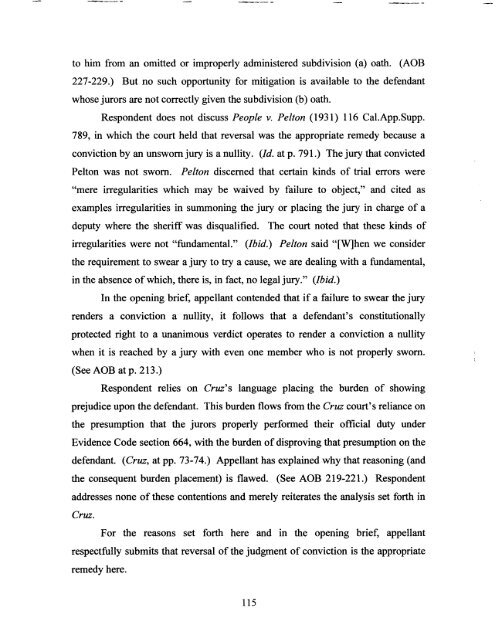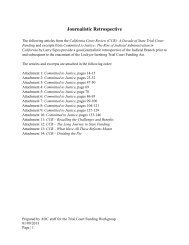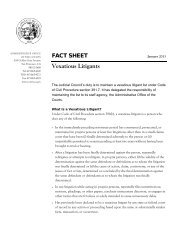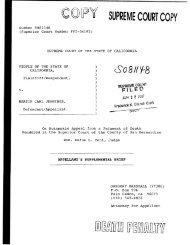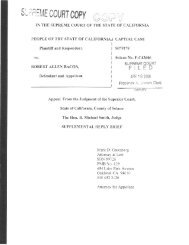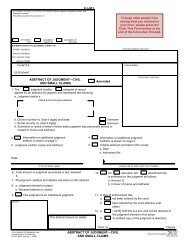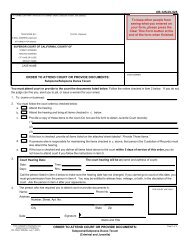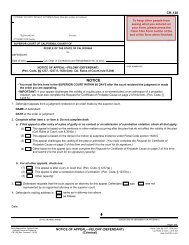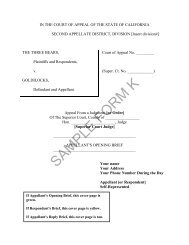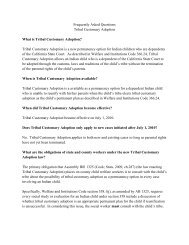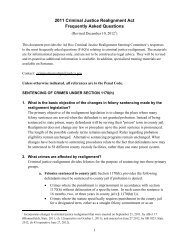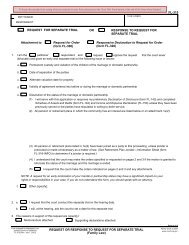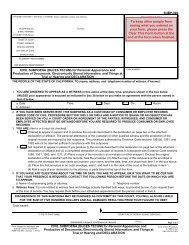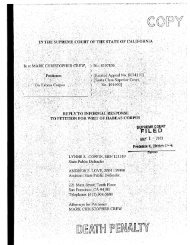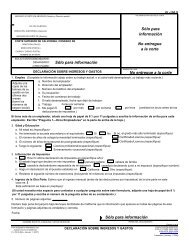Appellant, William Satele, Reply Brief - California Courts - State of ...
Appellant, William Satele, Reply Brief - California Courts - State of ...
Appellant, William Satele, Reply Brief - California Courts - State of ...
Create successful ePaper yourself
Turn your PDF publications into a flip-book with our unique Google optimized e-Paper software.
to him from an omitted or improperly administered subdivision (a) oath. (AOB<br />
227-229.) But no such opportunity for mitigation is available to the defendant<br />
whose jurors are not correctly given the subdivision (b) oath.<br />
Respondent does not discuss People v. Pelton (1931) 116 Cal.App.Supp.<br />
789, in which the court held that reversal was the appropriate remedy because a<br />
conviction by an unsworn jury is a nullity. (Id. at p. 791.) The jury that convicted<br />
Pelton was not sworn. Pelton discerned that certain kinds <strong>of</strong> trial errors were<br />
"mere irregularities which may be waived by failure to object," and cited as<br />
examples irregularities in summoning the jury or placing the jury in charge <strong>of</strong> a<br />
deputy where the sheriff was disqualified. The court noted that these kinds <strong>of</strong><br />
irregularities were not "fundamental." (Ibid.) Pelton said "[W]hen we consider<br />
the requirement to swear a jury to try a cause, we are dealing with a fundamental,<br />
in the absence <strong>of</strong>which, there is, in fact, no legal jury." (Ibid.)<br />
In the opening brief, appellant contended that if a failure to swear the jury<br />
renders a conviction a nullity, it follows that a defendant's constitutionally<br />
protected right to a unanimous verdict operates to render a conviction a nullity<br />
when it is reached by a jury with even one member who is not properly sworn.<br />
(See AOB at p. 213.)<br />
Respondent relies on Cruz's language placing the burden <strong>of</strong> showing<br />
prejudice upon the defendant. This burden flows from the Cruz court's reliance on<br />
the presumption that the jurors properly perfonned their <strong>of</strong>ficial duty under<br />
Evidence Code section 664, with the burden <strong>of</strong>disproving that presumption on the<br />
defendant. (Cruz, at pp. 73-74.) <strong>Appellant</strong> has explained why that reasoning (and<br />
the consequent burden placement) is flawed. (See AOB 219-221.) Respondent<br />
addresses none <strong>of</strong> these contentions and merely reiterates the analysis set forth in<br />
Cruz.<br />
For the reasons set forth here and in the opemng brief, appellant<br />
respectfully submits that reversal <strong>of</strong> the judgment <strong>of</strong> conviction is the appropriate<br />
remedy here.<br />
115


